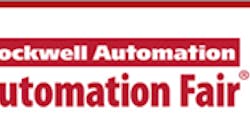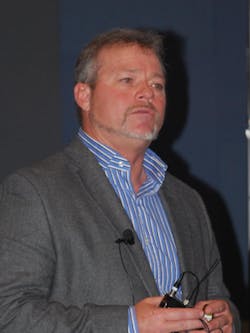For downstream process industries like chemicals, today's low oil and natural gas prices are inspiring a number of new expansions, renovations and upgrades, particularly in ethylene production and in agricultural chemicals. And, for a growing number of these processors, the PlantPAx DCS and other Connected Enterprise technologies from Rockwell Automation provide a viable and forward-looking automation and information management platform.
Several of these recent efforts and projects were demonstrated during the Chemical Industry Forum held at Automation Fair this week in Chicago.
Trey Hamblet, VP of chemical processing research at Industrial Info Resources (IIR), first set the stage for Forum attendees, reporting that there are presently about 2,600 chemical processing projects worth more than $300 billion underway worldwide, including $192 billion in China and East Asia and $50 billion in North America.
"Natural gas is the number one promoter of these of these projects, and its continuing cost advantages continue to drive optimism," said Hamblet. "And our 24-month outlook shows another 4,300 individual chemical projects, including $118 billion in East Asia, $98 billion in North America and $85 billion in the Middle East."
Connected Enterprise fits gloves
For instance, Liu Wei, production manager at Shandong Intco Medical in Shanghai, reported his plant has 45 production lines that manufacture 10 billion nitrile-based gloves for medical examination and food handling. Thanks to low-cost fuel and increasing demand, the company is building five more lines using a butyronile process that must be tightly controlled, Wei explained, especially the viscosity, pH and temperature of its raw materials. Intco began this project in May 2015 and plans to complete it in December.
"The Connected Enterprise, Ethernet networking and add-on software profiles reduced El Dorado's installation time and TCO tremendously." Brian Etress of Rockwell Automation explained how El Dorado Chemical was able streamline installation and reduce lifecycle costs in its latest capacity expansion project.
"These five lines include systems for boilers, raw materials, air compression and cooling, and our automation includes process control, SCADA, drive and motor control, instrumentation and actuators," said Wei. "We're implementing PlantPAx DCS for these production lines, as well as online configuration for HART instrumentation and modular application software. These will give us improved total cost of ownership, and reserve capacity and flexibility for smarter plant operations in the future."
In fact, Wei added that three of the new glove lines enabled by PlantPAx already are up and running. "We're getting better temperature control, which facilitates stable product quality," said Wei. "Also, better alarm functions in the DCS are reducing maintenance work needed on field devices. Its modular application code and coding library for controllers and SCADA tasks are easier for the engineer to use. We're also using Ethernet to connect our variable frequency drives to the DCS. In the future, we're also going to do asset management from our HART instruments, operations metrics and reporting via Ethernet, which means we can also view them on our secure VPN from anywhere on tablet PCs."
PlantPAx for explosives and fertilizer
Another beneficiary of inexpensive natural gas is El Dorado Chemical in south-central Arkansas. The firm is a longtime supplier of ammonium nitrate (AN) for explosives and blending into fertilizers, and it produces nitric acid (NA) for sale and for use in AN production. These operations routinely required importing up to 40 tons of ammonia per hour, and so El Dorado's manager recently decided to make NH3 onsite rather than bring it in.
To minimize time to market, El Dorado opted not to build a greenfield ammonia plant, and instead bought and relocated an NH3 plant from south Louisiana. The relocated plant includes a compressor deck—50,000-hp total in this case—steam drum deck, strippers, absorbers, syngas reactor, CO shift reactors and other equipment. It's SIL 2-rated, and its three large trains produce a lot of heat—more than 500,000 tons per hour of 1,500-lb steam for its drive turbines, co-generation units and primary reformer process.
"El Dorado's two main processes are now ammonia and NA, which means first making ammonia, then nitric oxide, and finally NA," said Gordon Bordelon, large project pursuit leader for heavy industries at Rockwell Automation. "These are very exothermic processes. The engineers at El Dorado say they're basically a steam plant that also makes ammonia."
As big as the ammonia plant move was, it was just part of El Dorado's $600-million site improvement. This overall project also included a new NA concentrator unit and NA plant; integration of NH3 and NA compressor packages; 600-psig package boiler; 14-megaWatt (MW) steam turbine generator skid; and a 30,000-ton atmospheric NH3 double-walled storage tank.
"El Dorado also had a goal of consistent controls across all vendor packages, and so ControlLogix was selected as the controller of choice for its skids, basic process control system [BPCS] and safety instrumented systems [SIS]," said Brian Etress, project lead engineer, Rockwell Automation. "The total project was approximately 4,100 I/O for the BPCS plus 850 I/O for the SIS and burner management system. Using 1715 redundant I/O and ControlLogix allowed us to maintain a SIL 2 rating,” Etress said.
"In addition, PlantPAx was chosen as the platform for the BPCS, which allowed non-Rockwell Automation systems using Modbus communications to be integrated into the BPCS,” Etriss said. “We also used redundant I/O for critical BPCS control loops and all SIS I/O points. The PlantPAx system was virtualized and deployed on location-redundant, fault-tolerant servers. The plant adopted a Mynah operator training simulator (OTS) to train operators on its NH3 process, and worked with exida to rationalize alarms." The expanded plant is scheduled to start up in April 2016.
"The Connected Enterprise was great for El Dorado, and gives it an integrated data collection, data aggregation and reporting capabilities," added Etress. Rockwell Software technologies deployed at El Dorado include FactoryTalk Historian, FactoryTalk AssetCentre, FactoryTalk VantagePoint EMI and FactoryTalk ViewPoint.
"These solutions give El Dorado near real-time status of its processes in formats that can be easily consumed by various levels its operations staff,” explained Etriss. Likewise, Allen-Bradley IntelliCENTER motor control centers (MCCs) reduced installation time and costs. “This intelligent motor control also provides valuable insight into equipment operations, and improves total cost of ownership and predictive maintenance. In all, the Connected Enterprise, Ethernet networking and add-on software profiles have reduced El Dorado's installation time and TCO tremendously."








